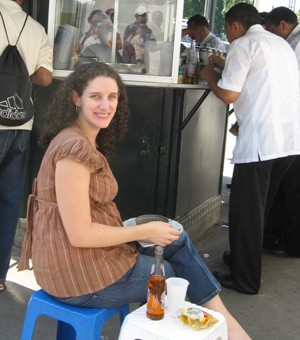
UC Professor Pens Book on Direct Sales of Makeup in Ecuador
Erynn Masi de Casanova is an assistant professor in the Department of Sociology and affiliate faculty of the Department of Womens, Gender, and Sexuality Studies in the University of Cincinnatis McMicken College of Arts & Sciences. For the last decade, Casanova has been conducting research in Ecuador. Her first book, due out in June by University of Texas Press, is called Making Up the Difference: Women, Beauty and Direct Selling in Ecuador. The book has been selected by the National Womens Studies Association for the Sara A. Whaley Award, a book award on the topic of women and labor.
Tell us a little about Making Up the Difference.
The book is based on fieldwork that I conducted primarily in Guayaquil (Ecuadors largest city) in 2007-2008. I studied Ecuadorian women who sell cosmetics and other products in order to make up the difference between their families limited incomes and their expenses. The book focuses on three aspects of this work: gender relations, image/appearance and the broader economic context.
What gave you the inspiration to tackle the subject of direct sales in Ecuador?
I knew some women who had made a lot of money selling and I was intrigued by their experience, which I soon learned was not typical of most direct sellers. I was also drawn to the glossy four-color sales catalogs, which were full of images of luxury and wealth (and blue-eyed blondes), and seemed so disconnected from the everyday Ecuadorian context.

Her book
How are direct sellers different in Ecuador than in other parts of the world?
On one hand, theyre similar to direct sellers anywhere else: they perceive a lack of opportunity in the formal labor market and see direct sales as a valid income-earning strategy. On the other hand, there are certain cultural factors specific to urban Ecuador that they have to consider: peoples reluctance to talk about money directly, for example, which can make collecting payments from customers difficult.
What are some interesting things you learned while researching?
The biggest surprise for me was finding that men are involved in selling cosmetics and perfumes! I thought the book would be all about women. But men are involved directlyselling productsand indirectly, in their stances toward their wives work or as customers. It was also interesting to see how women crafted an image or appearance of professionalism in order to distinguish their work from other, less prestigious, types of selling.
What are your goals with publishing this book?
I hope to provide a new perspective on womens work in a globalizing world, where work is more precarious and informal than ever. The book tells the stories of women who valiantly cobble together multiple income-earning strategies to support themselves and their families in the midst of tremendous poverty, and who do so with enthusiasm, pragmatism and a sense of humor.
What are the biggest takeaways from your research?
Even flexible jobs like direct selling dont alleviate the stress women feel in balancing work and family. And in times of economic crisis, people turn to alternative forms of employment and consumption. If I dont have the connections or education to work in the formal economy, I can sell cosmetics. If I dont have $50 to buy a nice perfume, I can buy from my direct seller and pay in weekly installments of $5.
Is there anything else you would like to add?
Id like to thank the women in Ecuador who shared their stories with me and invited me in to the social world of direct selling. The book will be published in Spanish next, and I hope that when they read it, theyll feel that I have accurately represented their experiences.
Related Stories
UC’s spring Visiting Writers Series promises robust, diverse...
December 20, 2024
Lovers of literature, poetry and the written word can look forward to a rich series of visiting writer presentations, offered through UC’s College of Arts and Sciences department of English, coming this spring.
Should voters have more say in Ohio's Legislature?
December 19, 2024
UC Professor David Niven talks to WVXU about gerrymandering in Ohio.
How tadpoles make the leap to frogs
December 18, 2024
In his biology lab, UC Professor Daniel Buchholz and his students are using a National Science Foundation grant to study the hormones that trigger metamorphosis in frogs.
